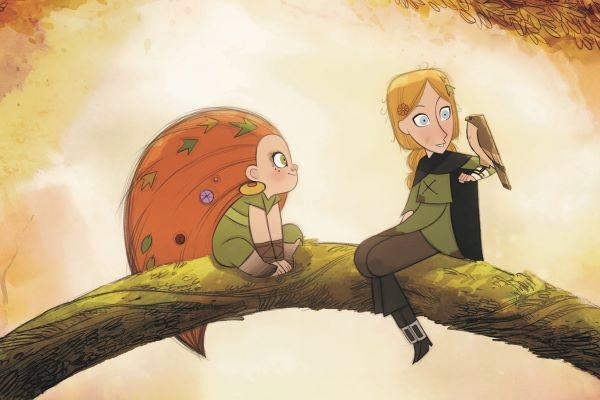Having left Ireland for Afghanistan in their lovely 2017 film The Breadwinner, Kilkenny-based animation studio Cartoon Saloon return to their homeland for their fourth feature Wolfwalkers. Even by their very high standards, it’s a howling triumph. Steeped in the myths and fables of Ireland, Wolfwalkers is a family film with surprisingly adult themes like colonialism, the uneasy relationship between humanity and nature, and even organised religion. With gorgeous, tactile animation and robust, archetypal storytelling, it is a perfectly judged film that will enchant children (and adults) while very much respecting their intelligence.
In 1650 a victorious Oliver Cromwell (Simon McBurney) is literally cutting a swathe through Ireland. Arriving in Kilkenny he tasks his men with clearing the woods outside the city walls. To aid in this, he employs specialist wolf hunters to to eradicate the lupine presence from the forest. One of these is Bill Goodfellow (Sean Bean) who brings his daughter Robyn (Honor Kneafsey) to Ireland with him. Disobeying orders to stay away from the woods, Robyn meets Mebh (Eva Whittaker), an unruly and free-spirited girl who is rumoured to be a ‘wolfwalker’, humans who are able to exist as wolves when their human bodies sleep. Robyn finds herself torn between her father and her new friend, a situation which becomes life and death after she receives a bite herself.
Obviously, the animation is the first thing that grabs the attention. Besides looking stunning, the bold design incorporates both its mode of storytelling and its themes into its style. Kilkenny itself, and its inhabitants, are rendered in harsh angles. Perspective often looks blocky and geometric, and there is a deliberate, disconcerting sharpness that recalls German Expressionism. The style reflects the harsh, puritan doctrine of the English. Mebh, her mother Moll MacTíre (Maria Doyle Kennedy) and their threatened forest recall traditional Celtic decoration. Fluid spirals and softened pastels are in evidence. The contrasting styles highlight the dichotomy between civilisation and nature, and ‘true faith’ and ‘superstition’.
Even more stunning is the world experienced from the perspective of the wolf. Moore, Stewart and team leech the colours from the surroundings and highlight the wolves’ heightened smell and hearing as brightly coloured lines streaking through the greys of their surroundings. It is a simple but startling way to communicate the wonder of Robyn and the unfettered joy of a new friendship. Kneafsey and Whittaker complement the incredible visuals with spirited verbal sparring and rough-and-tumble dialogue. On these terms, Cartoon Saloon are quite simply as good as Studio Ghibli at presenting magical, universal stories from the perspective of children.
Another striking element of Wolfwalkers is in the rather subversive attitude it has to Christianity in Ireland, in that it sides very squarely with the Pagan heritage of the country. McBurney’s warty, stentorian Cromwell is presented as every bit the tyrannical zealot, entirely analogous to the depiction of the Taliban in The Breadwinner. It could be that this was the best way of presenting the themes of colonialism as civilisation (the film could make a strange thematic double bill with John Hillcoat‘s Outback western The Proposition), and Puritanism served as an apt ironic metaphor for this. It could also be that it just set up a rollicking great tale of good and evil, full of magic and legend.
Moore and Stewart never lose sight of the stakes. For all the joy and wonder, Wolfwalkers is also, like all the best fairy tales, full of darkness and danger. We are always on the side of the Mebh and her battalion of wolves, but we are very aware that they are wild beasts with a potential lethality pulsing behind every snout. The directors and writer Will Collins tease us with our learned cultural knowledge of the more familiar myths of lycanthropy. While we are on board with Robyn’s wander into the forest, we can’t help but feel the tension that a lifetime of Little Red Riding Hood, John Landis, Angela Carter and countless others has instilled. It is this balance between the enchanting and the frightening that the filmmakers have got so right. It is quite possible that younger children may well find parts of Wolfwalkers scary, but delightfully so.
Cartoon Saloon have been surprise nominees for Academy Awards before. Were Wolfwalkers to be similarly honoured, it will surely be expected. In fact, it would surely be a deserved winner. It isn’t just one of the best animated films of 2020, but one of the best films period. A fast-paced and heartfelt adventure that is immaculate in its craft, and brimming with love for the culture it depicts, it is hard to see it as anything other than an instant classic.
Screened as part of BFI London Film Festival and in cinemas from Fri 30 Oct 2020
